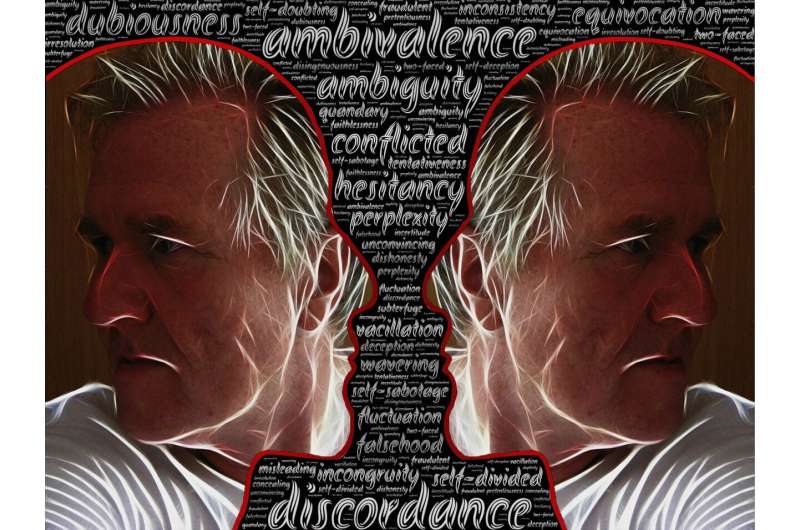This article has been reviewed according to Science X's editorial process and policies. Editors have highlighted the following attributes while ensuring the content's credibility:
fact-checked
peer-reviewed publication
trusted source
proofread
Study suggests ambivalence and polarized views can promote political violence

Feeling ambivalent about a political issue might seem to be a recipe for indecision and even inaction. But a new study suggests, surprisingly, that ambivalence can actually lead some people—especially those with polarized views—to be more supportive of extreme actions, such as violence.
The reason? Researchers found that ambivalence creates discomfort in those with extreme views by making them feel weak or insecure about their beliefs—and that can lead them to compensate for that weakness by supporting extreme actions to signal strength.
"When people have these polarized views on a political topic, but also feel some conflict about that belief—that is really a potent combination," said study lead author Joseph Siev, who did the work as a doctoral student in psychology at The Ohio State University.
"That's when they are most likely to support extreme actions in support of their view."
Siev, who is now a postdoctoral fellow in consumer behavior at the University of Virginia, conducted the research with Richard Petty, professor of psychology at Ohio State. Their study was published June 12, 2024 in the journal Science Advances.
Previous research has shown—and this study confirmed—that ambivalence about a political issue typically leads people to avoid taking moderate actions such as voting or donating money in support of that issue. It makes sense that people would be less likely to act on an issue if they have mixed feelings, Petty said.
And that's why these findings for extreme behaviors surprised the researchers, he said.
"We thought that people with extreme views who were the most one-sided about their beliefs would be the ones who would most support extreme actions, but that didn't turn out to be the case."
The researchers did a series of studies on various political issues including abortion and COVID-19 mask mandates, which all had similar results. Those with strong but conflicted views were more likely than others to support extreme actions like getting opponents to their views fired from their jobs, even if they wouldn't bother to take more moderate actions, like voting in support of their opinions.
One study showed this phenomenon could induce real support for extreme political groups. The researchers asked 250 online participants their views on environmentalism and how ambivalent they felt about those beliefs.
Participants were told that, after the study, that they would be offered the opportunity to win a $10 prize that they could share with real-life environmental organizations, some of which were radical (e.g., "Just Stop Oil") and others more moderate (e.g., "The Sierra Club").
Participants read statements adapted from the groups' actual mission statements that made clear that they were either well outside or inside of the mainstream.
For instance, one radical organization's statement said its mission was "to use extreme tactics when necessary to defend Mother Earth." Another's said it would use "civil resistance and disobedience, direct action, vandalism, and traffic obstruction" to meet its goals. The mainstream groups were described in moderate terms.
Results showed that those who were most conflicted about their polarized environmental beliefs pledged to give more of their prize money to the extreme organizations. For the moderate organizations, those with extreme beliefs and ambivalent feelings were not any more likely than others to give money.
"This shows that the effect can have real-life consequences—those who are conflicted are more willing to give their money to extreme organizations," Siev said.
Another study showed that the willingness to support extreme actions was the result of people feeling especially uncomfortable if they were ambivalent about their extreme views.
"Those who have these extreme views, but still feel conflicted about them, feel a need to prove themselves, to show that their beliefs are real and strong," Petty said.
It is similar to people who have fragile self-esteem, Petty said. Those who think they're great but feel conflicted about that belief have a desire to prove their worth. A boss who has fragile self-esteem is more likely than one with secure self-esteem to take an extreme action to show his or her strength, like firing an employee who makes a challenge.
The study didn't examine the cause of ambivalence among some with radical beliefs, but Petty said there are several possibilities. Some people may have extreme views on an issue, but feel conflicted because many of their friends or family have opposite views. Or they may strongly support a politician, but feel negatively about some of his views or public actions.
These findings are especially important now in the United States, with political polarization at such high levels, Siev said.
"This research contributes to our understanding of how psychological factors can make political extremism attractive," Siev said.
"Our hope is that this understanding can help us develop anti-extremism interventions."
More information: Joseph Siev, Ambivalent attitudes promote support for extreme political actions, Science Advances (2024). DOI: 10.1126/sciadv.adn2965. www.science.org/doi/10.1126/sciadv.adn2965
Journal information: Science Advances
Provided by The Ohio State University





















